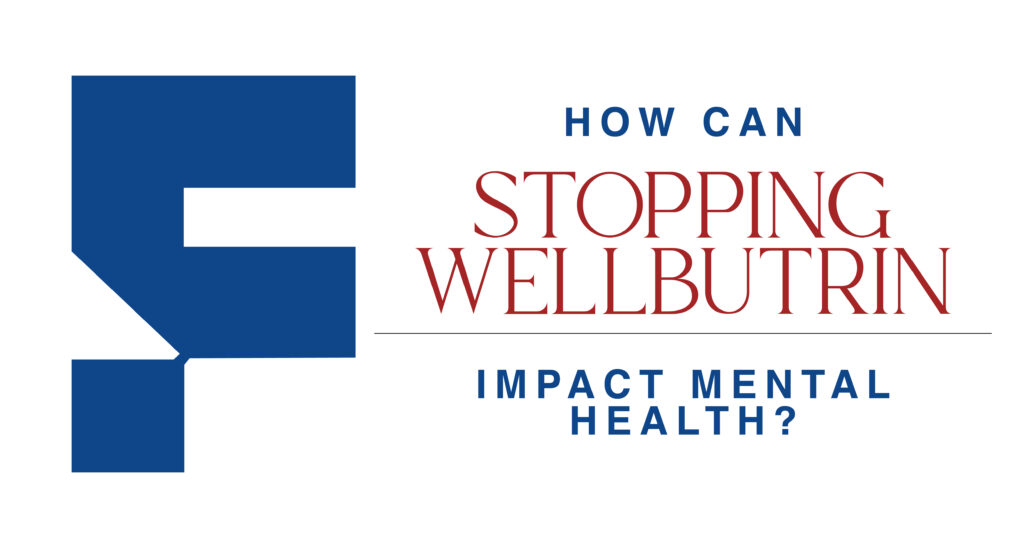When prescribed for conditions like depression, anxiety, or smoking cessation, Wellbutrin (also known by its generic name bupropion) can play a vital role in restoring balance and improving mental health. However, the way you stop taking this medication is just as important as how you start it.
One of the most common questions is, “Can I stop Wellbutrin cold turkey?” While the idea of stopping suddenly might feel tempting, doing so can have serious effects on one’s mental and physical health.
In this blog, we’ll discuss the risks of abruptly stopping Wellbutrin, common withdrawal symptoms, safe approaches like weaning off Wellbutrin, and how to get professional support to manage the transition.
Why Stopping Wellbutrin Abruptly Can Be Risky
To understand the dangers of quitting suddenly, it helps to know how Wellbutrin works. This medication influences neurotransmitters in the brain, particularly dopamine and norepinephrine, which regulate mood, energy, and focus. Over time, your brain adapts to this chemical balance.
When you stop Wellbutrin abruptly, your brain is suddenly deprived of this balance. The sharp drop can create a neurochemical shock, leading to severe withdrawal symptoms and increasing the risk of relapse into depression or nicotine dependence.
This is why experts strongly advise against attempting to stop Wellbutrin cold turkey. The dangers include not only emotional instability, but also physical symptoms that can be overwhelming without medical supervision.
First Responders of California
Common Wellbutrin Withdrawal Symptoms
The experience of Wellbutrin withdrawal symptoms varies from person to person, depending on how long the medication has been taken, the dosage, and individual brain chemistry.
Mild symptoms can include:
- Irritability
- Anxiety
- Headaches
- Sleep disturbances

However, more severe cases can bring about:
- Suicidal thoughts
- Intense mood swings
- Panic attacks
- Severe fatigue
Another critical factor is the duration of withdrawal. Some symptoms may resolve within a week, while others can experience lingering effects for several weeks or months. According to the National Institute of Mental Health, any abrupt disruption in antidepressant use increases vulnerability to relapse, underscoring the importance of medical guidance.
The Importance of Weaning Off Wellbutrin
Rather than asking, “Can I stop Wellbutrin cold turkey?”, a better question is: “How can I taper safely?” Weaning off Wellbutrin is recommended because it allows your brain to adjust gradually. Tapering reduces the severity of withdrawal symptoms by preventing a sudden chemical imbalance.
Patients often report fewer physical effects and less emotional turbulence by reducing dosage in small, manageable increments. This process is especially important for people who have taken the medication long-term. Think of it like landing a plane: slowing down gradually ensures safety, while stopping suddenly can cause a crash.
Wellbutrin Side Effects During Discontinuation
It’s important to distinguish between Wellbutrin side effects experienced while taking the medication and those that appear during discontinuation.
- While on Wellbutrin. Some people may notice side effects like dry mouth, weight changes, or insomnia.
- During Discontinuation. Symptoms are more about imbalance, like dizziness, mood swings, or flu-like symptoms.

This distinction matters because many confuse side effects with withdrawal. Understanding the difference can help patients and doctors respond more effectively to what’s happening in the body.
First Responders of California
Strategies for Quitting Wellbutrin Safely
The safest way to stop Wellbutrin is through evidence-based strategies guided by a healthcare professional. Here are some approaches that work:
- Tapering Schedule. Gradually lowering dosage under medical supervision.
- Lifestyle Changes. Incorporating exercise, proper sleep, and nutrition to stabilize mood.
- Therapy. Cognitive Behavioral Therapy (CBT) and counseling help address the emotional challenges of withdrawal.
- Support Groups. Sharing experiences with others can provide encouragement and accountability.
By combining these strategies, individuals can reduce the risk of relapse into depression or smoking while ensuring a smoother recovery. According to the National Alliance on Mental Illness (NAMI), discontinuation symptoms vary widely and should be closely monitored to prevent relapse.
Wellbutrin Dosage Reduction Tips
| Approach | Why It Helps | Notes |
| Gradual tapering | Allows brain chemistry to adjust slowly | Avoids severe withdrawal symptoms |
| Monitoring symptoms | Keeps track of emotional & physical responses | Report changes to a doctor |
| Personalized schedule | Tailored to individual needs | One-size-fits-all does not work |
| Support system | Provides accountability and encouragement | Family, friends, or groups |
Remember, these are general guidelines, not medical advice. The most effective Wellbutrin dosage reduction plan is designed specifically for you by a healthcare provider.
Consulting a Healthcare Professional for Safe Discontinuation
Professional oversight is crucial in managing Wellbutrin discontinuation. Doctors can create a tapering plan, monitor symptoms, and adjust the schedule based on how your body responds. In some cases, urgent medical help may be needed, mainly if severe symptoms like suicidal ideation or intense mood swings occur. By consulting a healthcare professional, you minimize risks and receive the emotional support necessary to navigate this transition safely.
Getting Help at First Responders of California
At First Responders of California, we specialize in helping individuals safely and effectively transition off medications like Wellbutrin. Our approach combines medical oversight with therapeutic support and holistic care.
Services include:
- Supervised tapering schedules tailored to your needs.
- Individual and group therapy for emotional balance.
- Holistic practices such as mindfulness and stress reduction.
If you’re considering quitting Wellbutrin safely, our team is here to guide you through every step with compassion and expertise. If you or a loved one is thinking about stopping Wellbutrin, don’t do it alone. Contact First Responders of California for personalized guidance and support. Visit us to learn more and get started on a safe, supervised path to recovery.
First Responders of California
FAQs
- What are some common Wellbutrin withdrawal symptoms you might experience when stopping the medication abruptly?
You may experience irritability, anxiety, headaches, mood swings, or in severe cases, suicidal thoughts. Symptoms vary in intensity and duration depending on your dosage and history.
- How can stopping Wellbutrin abruptly increase the risk of severe withdrawal symptoms?
Abruptly quitting disrupts your brain’s chemical balance, making you more prone to extreme mood changes, panic attacks, or relapse into depression or smoking. This sudden shift can also intensify preexisting mental health challenges, making recovery harder.
- What is the importance of weaning off Wellbutrin gradually, and how does it help minimize withdrawal side effects?
Gradual tapering allows your brain to adjust slowly, reducing the intensity of withdrawal symptoms and lowering the risk of relapse. It creates a smoother transition that helps you maintain overall emotional stability.
- What strategies can be effective for quitting Wellbutrin safely and reducing the risk of withdrawal symptoms?
Safe strategies include tapering under medical supervision, adopting healthy lifestyle changes, engaging in therapy, and seeking support from family or groups. Combining these approaches strengthens both your mental resilience and long-term recovery success.
- How can a healthcare professional assist in creating a Wellbutrin dosage reduction plan for safe discontinuation?
Healthcare providers tailor tapering schedules, monitor your progress, and make adjustments based on your unique needs to ensure safety and comfort. They also provide guidance and reassurance, helping you feel supported throughout the process.












